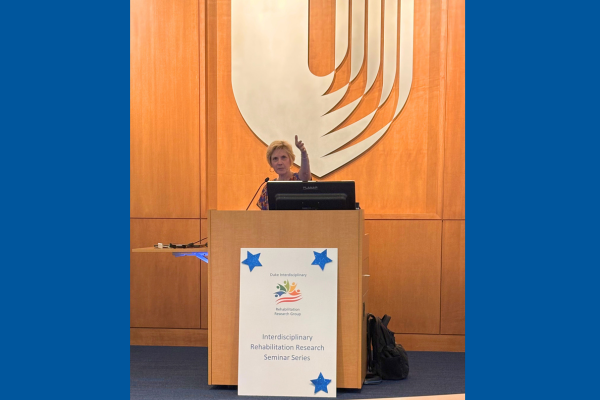
In a compelling session of the Interdisciplinary Rehabilitative Research Seminar Series, Duke DPT and Duke OTD co-hosted a presentation by Amy M. Pastva, PT, MA, PhD, Professor in the Department of Orthopaedic Surgery and Director of Research for the Duke Doctor of Physical Therapy Division. Her talk, “The Vital Sign We Forgot: Function in Acute Heart Failure—Evidence from REHAB-HF and REHAB-HFpEF,” highlighted an often-overlooked marker of health and recovery: physical function.
“Vital signs like heart rate, blood pressure, oxygen saturation are routinely tracked over time in healthcare visits, but what important factor isn’t? Function – how we move, act, and engage in the world,” Dr. Pastva emphasized. “This is especially critical for older adults and for those managing chronic conditions.”
Acute decompensated heart failure (ADHF) is the most frequent Medicare discharge diagnosis, accounting for over 1.2 million hospitalizations in older adults annually. It is associated with severe physical disability, cognitive dysfunction, depression, poor health-related quality of life (HRQOL), frequent rehospitalizations, loss of independence, high mortality, and high healthcare costs exceeding $39 billion per year. Despite substantial efforts, most trials — including those testing a range of pharmacologic and care-coordination strategies — have failed to improve outcomes in this high-risk population, suggesting that key drivers of poor recovery remain insufficiently addressed. Among these drivers, hospitalization itself–and the accompanying hospital-associated immobility–can further exacerbate physical and cognitive vulnerabilities, leaving older patients especially susceptible to persistent disability, functional decline, and rehospitalization.
Dr. Pastva’s research, conducted through the REHAB-HF (Rehabilitation Therapy in Older Acute Heart Failure Patients) clinical trial, a multicenter, NIH-funded study, was among the first to identify severe impairments in physical function as a central, modifiable, and often overlooked contributor to poor recovery in older adults with ADHF. The trial demonstrated that a tailored, multidomain rehabilitation program can significantly improve physical function, quality of life, and independence in this population. This work is now being extended in the ongoing REHAB-HFpEF Phase 3 trial, which focuses on the most common form of heart failure in older adults—preserved ejection fraction.
“The REHAB-HF program was intentionally designed to be structured yet individualized,” Dr. Pastva explained. “It begins early—often in the hospital—then transitions through outpatient and home settings, targeting four key domains of function: strength, balance, mobility, and endurance. Patients are not ‘too frail’ to participate; in fact, they need this intervention to prevent further decline.”
She emphasized that meaningful behavior change requires structured support beyond hospitalization, including transition-to-home and community-based exercise programs. “Low-tech, high-value interventions delivered by physical therapists are effective and accessible,” she noted. “Function is not just a measure of recovery—it’s a vital sign that reflects the health of the whole person.”
The seminar underscored how rehabilitative care can transform outcomes for individuals with heart failure and beyond—while also exemplifying Duke DPT and Duke OTD’s shared commitment to advancing interdisciplinary research that integrates rehabilitation science across the continuum of care.